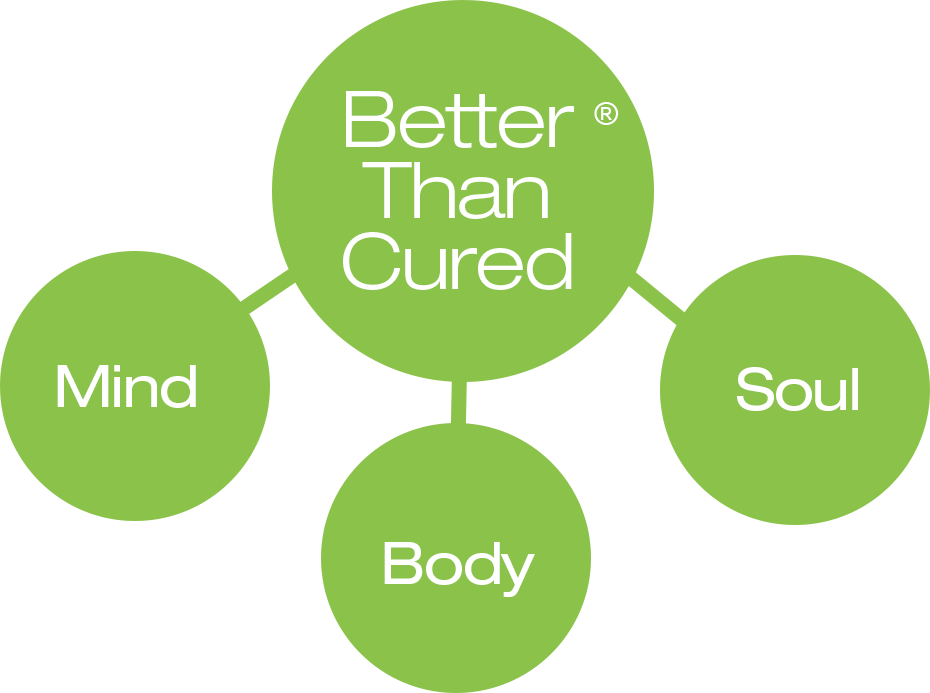
FAQ
BTC is for anyone who’s ready to feel “better than cured” and find a solution so they can get back to living their lives without fear. It doesn’t matter where you are on your journey. BTC can support you through the healing and recovery process and help you find answers and techniques that will build emotional resilience.
Many of my patients have had the same concern. I’d ask you to consider the same questions I ask them. Based on your previous experience, were there some elements of those less-than-successful therapies that did work, even just a little? What if you could combine what has worked along with new therapies and ground-breaking approaches that appeal to you?
What sets BTC apart from other approaches and treatments is that BTC, at its core, is a “framework” for treatment. Rather than looking at one method or theory as a one-size-fits-all treatment and then forcing the person to conform, BTC effectively integrates any number of modalities and therapies into a fully realized treatment plan based on the individual needs of each person. In other words, BTC acts as a blueprint so you (and your mental health support team) can explore new approaches and techniques and understand how to create a customized solution that successfully addresses your unique needs and circumstances.
Yes and no. You can familiarize yourself with BTC’s framework, and you may be able to implement some of BTC’s principles in your life right now. However, you’ll need the knowledge and wisdom from an experienced professional to create a treatment plan and evaluate its effectiveness over time. You’ll also need their help to know when and where to make adjustments as you move through your recovery journey. BTC is not intended to be used in place of appropriate mental health treatment.
If you’ve had a less-than-enjoyable experience with a therapist or psychiatrist in the past, you may be hesitant to give it another try. That’s completely understandable. Remember, though, that now you have BTC as a guide to help you find the right professional for your needs. A whole chapter of the book is dedicated to explaining the process, what to look for, and what questions to ask to ensure you find the right mental health support for your needs.
Maybe. Medication has many different uses in the treatment of mental health issues. For someone with mild anxiety or depression, lessening their medication over time–or eliminating it altogether–will probably be a goal in their treatment plan.
However, for others, medication may be a crucial part of their long-term treatment plan. Certain mental disorders can’t be adequately treated without long-term psychopharmacological intervention.
Medication should not be relied on as the only part of your treatment, however. Additional therapies and behavioral modifications are crucial to finding solutions that will help you live your best life and feel “better than cured.”
The short answer is, it depends. As mentioned above, certain mental illnesses can be very difficult–or impossible–to manage without psychopharmacological intervention.
Mild anxiety and/or depression symptoms can sometimes be managed successfully without medication. That will be up to you and your mental health team to determine.
In the early stages of recovery and healing, properly prescribed and managed medication can help ease the burden of processing and reprocessing hurt and pain from our past. This isn’t easy stuff to work through! And you can slowly come off of the medication when you no longer need the support.
If you find yourself resistant to considering any medication as part of your treatment plan, you may want to explore why you feel that way. Some people worry that they’ll turn into a “zombie” or lose their creativity. However, with the right prescription, good communication, and fine tuning, you should feel even more creative and ready to take on challenges.
Absolutely! BTC is designed to work with anyone who is committed to finding a solution for their mental health and is ready to feel “better than cured.” You’ll need to work closely with your mental health provider(s) to implement BTC, so you may want to share the section of the appendix with them that’s dedicated to medical and mental health professionals.
A licensed mental health counselor or therapist has a master’s degree in psychology or a related field and has completed additional training in the field to receive their license. They can offer counseling and psychotherapy to help treat mental health problems. They cannot diagnose or write prescriptions for mental health issues.
A psychologist has a PhD, PsyD, or EdD in psychology and has completed extensive training in their field and specialty. They can offer psychological testing and diagnose mental disorders as well as provide psychotherapy. With few exceptions, they cannot write prescriptions.
A psychiatrist is a medical doctor who has chosen a specialty in psychiatry. They can diagnose and prescribe medication for mental disorders, and they may or may not provide psychotherapy as part of their services.
You may want to start with your general practitioner or family doctor. They can help you decide where to start and can offer referrals for psychiatrists and mental health professionals near you.
Unfortunately, I’m only one psychiatrist, and I’ve already got a full schedule with prospective patients on a waiting list. I wish I could work with each and every person who is looking to feel “better than cured,” so that’s why I wrote this book!
I encourage you to work with your current mental health and medical professionals to create a BTC-friendly treatment plan.
While I welcome hearing from readers and fans of BTC, I’m unable to answer any medical or mental health-related questions for anyone other than my patients.
Click here for a list of links and resources to help you find mental health support close to you.
Dial 1-800-273-TALK (8255) or click here to reach the National Suicide Prevention Lifeline.
BTC is currently on submission to agents so, hopefully, sometime in 2021.

